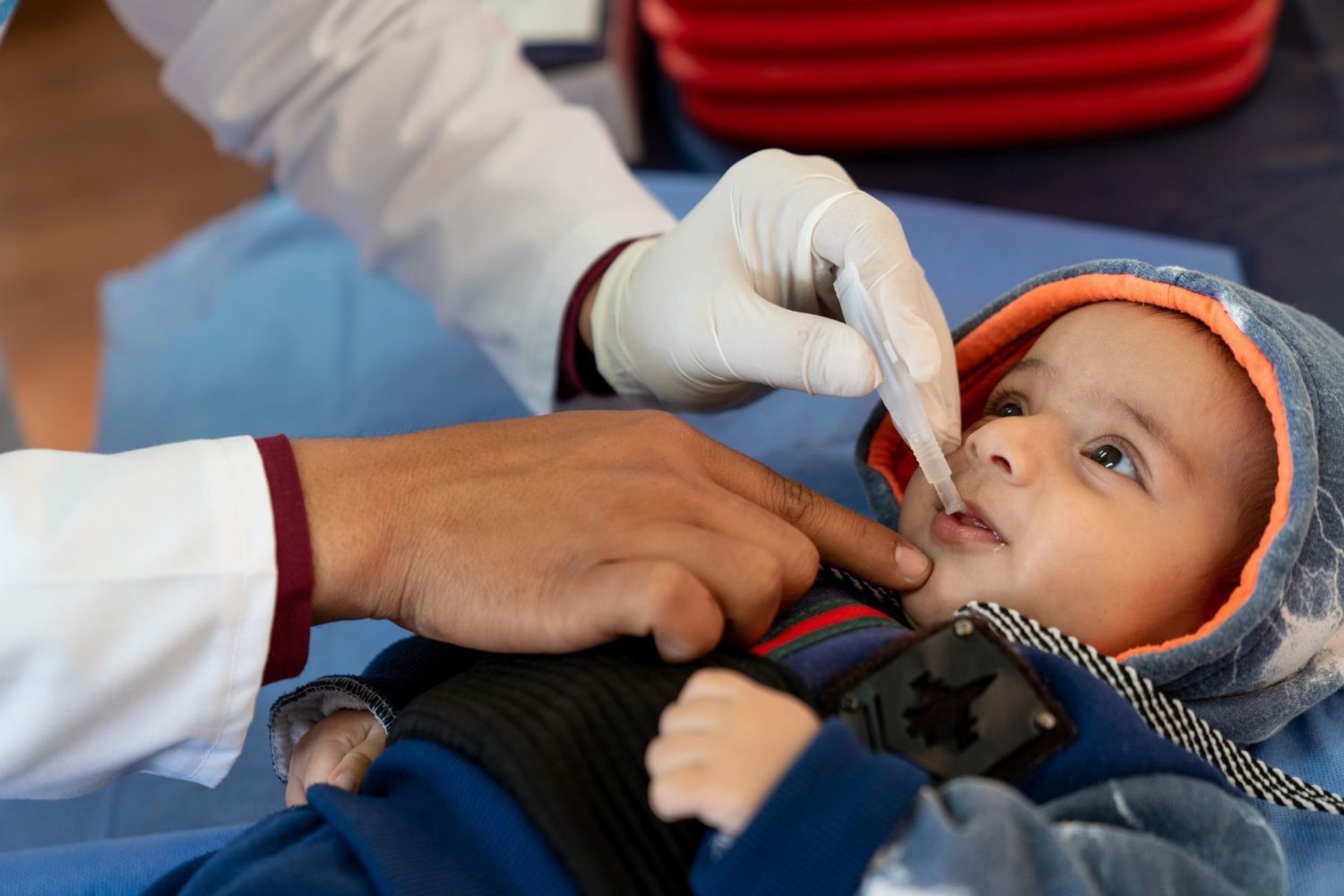SPOKESPEOPLE AVAILABLE
2 May 2019 – In conflict-affected countries and countries hosting refugees, UNICEF, with governments, the United Nations, and NGO partners, was able to reach over 34 million children with vaccination campaigns in the Middle East and North Africa, including in Iraq, Jordan, Libya, Syria Sudan, and Yemen since the beginning of the year.
Vaccines protect children against diseases and death and are critical to a healthy start to a child’s life. However, children in need of immunization especially in conflict areas are much less likely to have access to them.
Across the region, one in five children live in conflict or in countries affected by conflict. Children with no or little access to immunization are at a much higher risk of contracting serious diseases and even death. When children miss out on vaccines, the risk of diseases spreading increases for everyone. As a direct result of conflict, diseases which have long disappeared from the region have made a threatening comeback such as polio.
Whenever there is an outbreak of a disease, every single child is in need of vaccination and immediate response campaigns are critical to control the spreading.
“As World Immunization Week comes to an end, it’s a reminder that every child has the right to health. It is a moral imperative to provide children with good quality health care to grow up healthy and well. Access to health care is a basic right, it is certainly not a privilege,” said Geert Cappelaere, UNICEF Regional Director for the Middle East and North Africa.
UNICEF takes this opportunity to call for a number of immediate actions to reach every child with lifesaving vaccines in the Middle East and North Africa region.
- All parties to conflicts across the region and those with influence over them must continue to do everything possible to facilitate the delivery of vaccines and ensure that vaccination through routine systems and campaigns are a national priority in all countries.
- In war situations, parties to the conflict must provide unconditional and sustainable humanitarian access to reach every child with vaccination wherever they are and no matter who controls the area they live in. House to house modality should also be allowed as most effected wherever possible.
- Humanitarian pauses, cessation of hostilities and days of tranquility should be applied to allow vaccination campaigns.
- All attacks on health personnel including health workers, vaccinators and facilities such as warehouses, cold rooms, vaccination spots and primary healthcare centres must stop.
- Protect the cold chain at all times. Vaccines must be stored at a certain temperature. Any damage to the cold chain will reduce the vaccine potency and vaccinated children will not be protected against vaccine preventable diseases.
Notes to editors
Despite the crucial and ongoing response that UNICEF provides against preventable diseases thanks to our generous donors, the support of the World Health Organization (WHO), Global Alliance for Vaccines and Immunization (GAVI), our partners on the ground and massive efforts of unsung heroes including millions of volunteers, we continue to face challenges to reach all children with vaccines in the Middle East and North Africa region.
- In Iraq, only 4 out of 10 children receive all recommended vaccines before their first birthday. Over 8 million children across Iraq were reached with both measles, mumps, and rubella (MMR), and oral polio vaccines (OPV) this year.
- In Jordan, UNICEF is supporting the Ministry of Health with an ongoing vaccination campaign including against measles in the al-Azraq Refugee Camp aiming to reach 20,000 children aged between six months to 15 years.
- In Lebanon, accelerated immunization activities have been implemented since June 2018 in response to a measles outbreak in high-risk areas whereby nearly 161,000 children were reached.
- In Libya, 1.4 million children under the age of six were vaccinated against polio and over 2.6 million children were vaccinated against measles in December 2018.
- In Sudan, an immunization campaign was launched earlier this month to vaccinate children against polio and measles. So far, nearly over 7.8 million children received vaccines against measles polio and were reached with vitamin A supplements.
- In Syria, 2.4 million children under five years were reached with polio vaccines since the beginning of the year.
- In Yemen, in the first nationwide measles campaign conducted in 2019, nearly 12 million children from six months to 15 years old at risk were vaccinated against Measles and Rubella. An ongoing oral cholera vaccination campaign in 3 districts reached nearly 600,000 children under the age of 15 years.
Link to multimedia here
For more information, please contact:
Unicef UK Media Team, 0207 375 6030, [email protected]
Emily Craigie, 0207 375 6058, [email protected]
About Unicef
Unicef is the world’s leading organisation for children, promoting the rights and wellbeing of every child, in everything we do. Together with our partners, we work in 190 countries and territories to translate that commitment into practical action, focusing special effort on reaching the most vulnerable and excluded children, to the benefit of all children, everywhere.
Unicef UK raises funds to protect children in danger, transform their lives and build a safer world for tomorrow’s children. As a registered charity we raise funds through donations from individuals, organisations and companies and we lobby and campaign to keep children safe. Unicef UK also runs programmes in schools, hospitals and with local authorities in the UK.
For more information please visit unicef.org.uk


